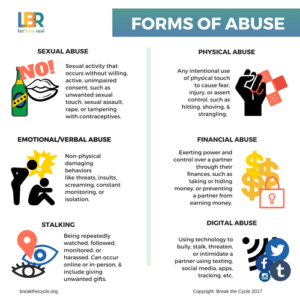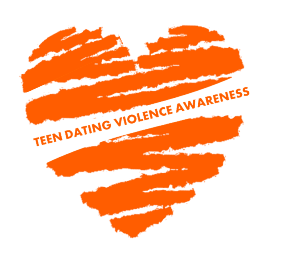February is Teen Dating Violence Awareness Month. This national effort is meant to bring awareness regarding abuse in teen and 20-something relationships. Because wellness also includes our mental and physical safety we want to share some information about this topic because EVERYONE deserves a safe and health relationship.
The National Domestic Violence Hotline
1-866-799-SAFE (7233)
Interesting Facts
- Girls and young women between the ages of 16-24 experience the highest rate of intimate partner violence. This is almost triple the national average.
- 85% of college students say they are not confident in their ability to recognize the warning signs of dating abuse.
- 1 and 3 teens in the United States will experience, physical, sexual or emotional abuse by someone they are in a relationship with before they become adults.
- Only 33% of teens who have been in a violent relationship reported it.
What Does Dating Abuse Look Like?
- Physical Abuse
Any intentional physical force meant to cause injury like: hitting, pushing, biting, strangling, kicking or using a weapon. - Verbal or Emotional Abuse
Non-verbal behaviors that cause harm like: threats, insults, constant monitoring, humiliation, intimidation, isolation or stalking. - Sexual Abuse
Any action that affects a person’s ability to control how, what, when, and where sexual activity or circumstances take place this can include: rape, coercion and resisting access to birth control. - Digital Abuse
Using devices and social media to intimidate, harass or threaten a current or ex-dating partner. This includes demanding passwords, checking cell phones, cyberbullying, sending excessive or threatening texts and messages, stalking and non-consensual sexting. - Stalking
Repeatedly watching, following, monitoring or harassing another person or giving unwanted gifts. Stalking can occur online or in person. - Financial Abuse
Exerting any control over a partner’s finances by taking or withholding money or stopping a partner from earning or spending their money.
 Because some teens are becoming romantic as early as 12 to 13 years old it is important that we talk to our teens regularly, often and early. While you are raising your teen and the years before, it is important to help your child express their feelings in a healthy way and teach them how to make decisions that benefit their well-being. It is important to focus on what healthy relationships look like and how your teen can keep themselves safe.
Because some teens are becoming romantic as early as 12 to 13 years old it is important that we talk to our teens regularly, often and early. While you are raising your teen and the years before, it is important to help your child express their feelings in a healthy way and teach them how to make decisions that benefit their well-being. It is important to focus on what healthy relationships look like and how your teen can keep themselves safe.
The Three Main Components of Healthy Relationships are: Communication, Compromise and Care. Communication in a healthy relationship will allow both partners to feel safe to express their thoughts and feelings without fear of guilt or violence. Compromise in a healthy relationship will allow partners to look for peaceful solutions when disagreements arise, by finding a common ground and looking for a solution that is good for both partners. Caring in a healthy relationship is where partners show compassion and respect for each other by encouraging the best in each other and not tearing each other down.
The best way to teach what healthy relationships look like is to be a good example to your teen. Many times teens look for the same kind of people to date that they see in their parents. You should also make sure that your nonromantic relationships are healthy and provide time for your teen to see you engage with influential adults and peers that emulate the healthy and respectful choices you want your teen to make. Make sure to work on communication, compromise and caring in all your relationships so this will be a natural choice for your child.
Teens like to spend a lot of time on their devices and social media. Finding a good compromise with how much time and appropriate times of day to look at these technologies will help your teen have balance. Make sure you know what sites your teen is using and use them yourself. This will help you see how your teen is using social media and also help you to keep up with what is popular among your teen and their peers.
Another way to pay attention to what your teen is doing is to invite their friends and dating partners to join in your family activities. Encouraging your teen’s dating partners to join your family for dinners, movie and game nights and appropriate outings so your teen knows you are supporting them is important. This also gives you a chance to look for signs of abuse.
The Consequences of Teen Dating Violence
Teens that are in unhealthy, abusive or violent relationships may:
- Cry often and exhibit other emotional responses
- Experience depression or anxiety
- Engage in unhealthy behaviors like using cigarettes, alcohol and other drugs
- Show antisocial behaviors like lying, stealing, bullying and engaging in violence
- Consider or attempt suicide
It is important to create an open dialogue with your teen so they know that they can come to you with questions. Listen to what your teen is saying and not saying. Be relatable so your teen will trust you more. Let them know when you feel awkward or embarrassed or when you have made mistakes. Tell them about situations, you have experienced, that are similar to the ones your teen is experiencing so they will know that you know what it feels like to be in their shoes.
Talking About Healthy Relationships
- Encourage open, honest and thoughtful reflection by listening and encouraging debate rather than pointing out “wrong behavior.”
- Be sensitive and firm. Be aware of the changes your teen is going through. Let them know that you respect their opinions but sometimes your decisions are not going to match up to what your teen wants.
- Learn about teen development so you will be able to gauge if their behavior is normal experimentation or a cry for help.
- Understand the pressure and risks teens face so your teen will know you will listen to them and help them when they don’t know what choices to make.
- Take a clear stand. Make sure your teen knows how you feel about abuse, inappropriate language and disrespect, controlling behavior and any other forms of violence.
- Use “teachable moments” whether it is a TV show, movie, song, news, event or an experience of a friend to talk about healthy and unhealthy relationships.
- Teach your kids how to stand up for friends who are being treated badly.
- Accentuate any positive events that you see in your teens relationships so you are not always focusing on the risks and consequences.
- Be an active participant in your teens life by finding activities you can do together.
- Be realistic. You are going to make mistakes. Be honest about that, learn from it and teach your teens balance.
Being present in your teen’s life and alert to when something is not right will help you help your teen grow up knowing how to make decisions and face challenges and ask for help when they need to. Teach your teens that if the situation arrises that they have become a victim of dating violence, that it is NEVER acceptable and it is NEVER their fault.
If after all you have done, your teen isn’t ready to communicate with you about their relationship, don’t take it personal but still be proactive. There are several confidential groups with caring people to talk to:
Love is Respect
866-331-9474
866-331-8453 TTY
www.loveisrespect.org
National Domestic Violence Hotline
800-799-SAFE (7233)
800-787-3224 TTY
www.ndvh.org
Rape, Abuse & Incest National Network (RAINN) Hotline
800-656-HOPE (4673)
www.rainn.org
If at any time you feel that you or your teen are in immediate danger, call 911.
I hope this article was easy to understand and answered any questions you might have. There is more information to be found in the links below. If you have other questions that we could research for you please send Jamie Holloway, our Research Manager, an email on our Dear Jamie page and one of our Team Members will write an article to answer your question. If you are interested in becoming one of our contributing writers please Contact Us.
Resources and Start Learning More:
- How to Talk to Teens About Dating Violence by Futures Without Violence Staff
- Learn About Dating Abuse by Break the Cycle Staff
- Preventing Teen Dating Violence by Centers for Disease Control and Prevention Staff
- Teen Dating Violence Awareness Month by The Association of Junior Leagues International, Inc Staff
- Teen Dating Violence is On the Rise: What Can Parents Do? by Defend Innocence Staff
Related Articles
- Happy National Toothache Day!
- Nutrition, How do I Help My Children With This?
- Conditioning, a Valuable Component of Healthy Sports for Kids
- My Heart Attack Experience by Nancy Cho-Auvil
- What is Wellness?
I hope this article helps Fuel Your Wellness.
~
~
 Summer D Clemenson co-owns Clemenson Enterprises and Wellness Works NW with her wife, Karen G Clemenson. Their personal motto is Creativity, Honesty & Positivity are a must! This mantra helps them stay community and wellness minded in all they do. Summer also writes poetry and inspirational blogs @ ClemensonEnterprises.com. Her crochet art can be viewed and purchased @ KnottyWares.com & she loves special orders!
Summer D Clemenson co-owns Clemenson Enterprises and Wellness Works NW with her wife, Karen G Clemenson. Their personal motto is Creativity, Honesty & Positivity are a must! This mantra helps them stay community and wellness minded in all they do. Summer also writes poetry and inspirational blogs @ ClemensonEnterprises.com. Her crochet art can be viewed and purchased @ KnottyWares.com & she loves special orders!













